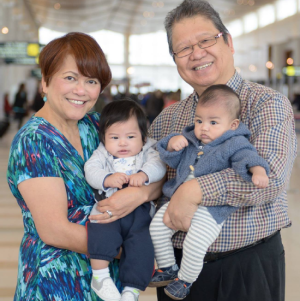Filipina Canadian leads opposition bloc in Manitoba politics
RED DEER, Alberta – A Filipina Canadian is set to prove that her leadership skills will enable her opposition party to win back Manitobans in the next provincial election.
New Democratic Party (NDP) interim party leader Flor Marcelino was catapulted to the helm of the party on May 7, following the April 16 election in Manitoba which saw the majority of the province’s electorates siding with the Progressive Conservative party after 17 years of NDP rule.
The conservatives clipped 40 out of 57 seats and won a majority of what previously were NDP strongholds. The election results forced NDP leader Greg Selinger to resign, giving way to the Filipina Canadian politician to become acting-leader of the party.
Manitoba is home to more than 60,000 Filipinos. Its capital, Winnipeg, has the third largest Filipino community in Canada next to Toronto and Vancouver, and Filipinos are the largest visible minority group in the city.
Proud history
Marcelino grew up very poor in Manila. Memories of her childhood include her father’s death when she was 10 years old after falling ill and not being able to pay hospital fees. Her mother was forced to give up her five young brothers and sisters, ages 2 to 8, to orphanages in different provinces.
“I got to stay with my mother because I was one of ‘foster parents plan’ children,” said the 64-year-old legislator in her speech during the NDP’s provincial meeting on May 9.
Living in rented rooms and surviving with little food on the table, her family’s vulnerable situation propelled Flor to get a proper education, work, become the family breadwinner and eventually reunite with her siblings.
“There was no such thing as a government social safety net,” she said. “Our faith in God and the support we got from our church sustained us through those dark days,” she added.
The compassion she received from others in those early years has been serving as fuel to her “life’s calling” to strive for social justice.
Not a newbie
Marcelino is no newbie in Manitoba’s political arena.
She started as a member of the legislative assembly (MLA) in 2007 and again in 2011, serving the electorates of Wellington and Logan, respectively. She maintained her seat as MLA for Logan after winning in the April 2016 election.
Her first salvo into politics was when she was 55 years old. Her victory was touted as a trailblazer because she was the first woman of color to be elected from the visible minority.
Marcelino’s family had been in Canada for 25 years when she ran for office, which meant she had to give up her job being the editor of the now-defunct The Philippine Times, a community newspaper she helped build in 1996.
She also served as Manitoba’s Minister of Multiculturalism and Literacy for almost three years before she took the helm as NDP interim-leader.
Regaining trust
“I know my colleagues have suggested me as interim leader not because of my skills in public speaking but due to my passion to reinvigorate our party and my ideas for grassroots organizing,” she said in an email interview with INQUIRER.net.
“As interim leader, I find it to be my duty to start the process of regaining the trust of Manitobans and to work towards defeating the conservatives in four years,” she added. NDP is set to elect its permanent leader in its October 2017 convention.
At the Manitoba legislature, the NDPs have criticized the conservatives’ austerity measures,which they say would reduce frontline services in health care, home care, childcare and education.
Marcelino particularly disliked the government’s “lack of commitment toward the environment, workers, seniors, minimum wage earners, women and newcomers.”
NDP’s internal conflicts, which began 2013, were reportedly a result of a controversial measure to increase sales tax to 8 percent in the province. The crisis snowballed into a break with the party by five members and decreasing its public popularity ratings before the 2016 poll.
“In my opinion, the friction we’ve had in the past in our caucus can be avoided in the future by increasing the role and participation of our elected MLAs in the decision-making process and strategic direction of our Official Opposition,” Marcelino explained.
“I believe a good leader listens. I also believe in having a consensus-based approach in deciding major decisions and strategies with our caucus. I will welcome suggestions, criticism, new ideas and ways of doing things,” she said.
Going grassroots
Marcelino strongly believes in on-the-ground community organizing. To do so, she wants her party executive and members to engage their constituents.
“I plan to visit our northern, urban and rural communities with our MLAs. I would like to also engage with organizations and groups that are interested in the wellbeing of our province. [The PC’s budget] cuts will hurt indigenous communities, working families and children, newcomers and migrant workers the most,” she said.
She would like a neighborhood-level strategy in reaching out to NDP supporters. To further sell her party in the 2020 poll, she even believes in the potential of personal letters, along with forums, consultations and online platforms.
Marcelino takes pride in her party’s achievements in Manitoba in the last 17 years, the most recent being the passage of Bill 18, or the Public Schools Amendments Act, an anti-bullying legislation which includes a clause protecting the rights of LGBTs.
Having been exposed to politics, she knows a woman of color like her leading an established political party faces tremendous challenges, first of which is acceptance.
“Like big businesses, political parties are populated mostly by men of European descent who are in top leadership positions,” she said, pointing out that in politics, mainstream women face fewer reservations from their male colleagues compared with women of color.
However, the race barrier can be overcome by women like her, she said. “With the changing demographics in Canada, these women who can prove their qualifications for the job which include a strong ability to organize and mobilize voters and supporters will succeed in getting elected to the top position,” she added.



